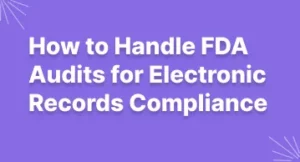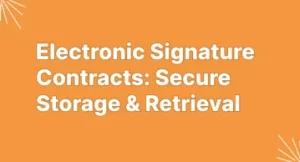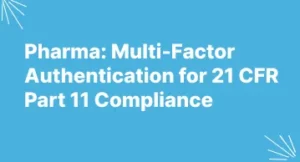Why should firms transition to Digital Contracts? A Guide to Legal Validity and Security
In the digital age, the business landscape is undergoing a profound transformation. New technologies, shifting consumer preferences, and the need for enhanced efficiency are pushing companies to rethink their traditional practices. One crucial area where this transformation is evident is in the adoption of digital contract signing and storage. Firms that recognize the importance of this shift stand to gain numerous advantages, from cost savings and efficiency to improved security and accessibility.
I. The Digital Transformation Landscape
Digital transformation is more than just a buzzword; it’s a fundamental shift that’s changing how businesses operate. In this digital era, where technology is deeply ingrained in our daily lives, companies must adapt or risk being left behind. The shift to digital contract signing and storage is a prime example of this transformation.
In today’s interconnected world, businesses are no longer bound by geographical boundaries, and consumers have come to expect the convenience and speed that digital processes offer. The days of endless paperwork, manual document processing, and physical signatures are rapidly fading into the past.
II. Digital Contract Signing – The What and Why
What is digital contract signing, and why is it vital for your business?
Digital contract signing involves the use of electronic signatures, making it possible to sign, send, and store contracts online. This shift from traditional, paper-based contracts offers numerous advantages:
- 1. Speed: Digital contracts can be signed in a matter of minutes, reducing the waiting time associated with physical signatures and postal deliveries.
- 2. Convenience: With the ability to sign from anywhere, digital contracts facilitate a seamless, user-friendly experience for all parties involved.
- 3. Cost Savings: By eliminating paper, printing, and administrative expenses, businesses can significantly reduce their operating costs.
III. The Legal Framework – Ensuring Validity
The legality of digital contracts is often a concern for businesses. It’s crucial to ensure that your digital contract signing processes are compliant with electronic signature laws and regulations in your region. However, digital contracts can actually offer enhanced security and compliance compared to traditional signatures.
-
1. Legal Validity of Digital Contracts:
Digital contracts, which involve the use of electronic signatures, are legally binding in most jurisdictions. The key to ensuring their validity lies in using a compliant digital signature platform. Here’s why digital contracts are just as enforceable as traditional paper contracts:- a. Digital Signature Laws: Many countries and regions have enacted specific laws to validate electronic signatures and digital contracts. These laws provide a legal framework that recognizes the enforceability of digital signatures. For example, in the United States, the Electronic Signatures in Global and National Commerce Act (ESIGN) and the Uniform Electronic Transactions Act (UETA) establish the legal validity of electronic signatures.
- b. Authentication Methods: Digital signature platforms utilize various authentication methods to verify the identity of the signatory, ensuring that the signature is genuine. This includes email verifications, PINs, or even biometric data like fingerprints. These methods add an extra layer of security to digital contracts.
- c. Audit Trails: Every step of the digital signing process is recorded in an audit trail, which acts as a digital log of events. This includes details of who signed the contract, when, and from which IP address. The audit trail serves as evidence of the contract’s authenticity and the parties involved in the signing process.
- d. Non-Repudiation: One of the significant advantages of digital contracts is non-repudiation, meaning the signatory cannot deny their signature. In traditional paper contracts, it’s challenging to prove that a person signed a document, but in the digital realm, with a clear audit trail and authentication, repudiation is nearly impossible.
-
2. Security Measures for Digital Contracts:
Digital contracts employ robust security measures to protect their integrity, making them tamper-proof and highly secure. Here’s an elaboration on these security measures:- a. Encryption: Encryption is a fundamental aspect of digital contract security. When a contract is transmitted or stored digitally, it’s encrypted, which means that the text is encoded into a secure format that can only be deciphered by someone with the encryption key. This ensures that the contract’s content remains confidential and secure during transmission or storage.
- b. Multi-Factor Authentication: Many digital contract signing platforms use multi-factor authentication (MFA) to enhance security. MFA requires the signatory to provide two or more forms of identification, such as a password and a one-time verification code sent to their mobile device. This additional layer of security ensures that only authorized individuals can access and sign the contract.
- c. Digital Signatures vs. Handwritten Signatures: Digital signatures are often more secure than handwritten signatures. Handwritten signatures can be easily forged, while digital signatures are based on unique cryptographic keys, making them extremely difficult to replicate or tamper with.
- d. Document Timestamps: Digital contracts typically include timestamps for each signature or change made to the document. This feature ensures that the contract’s history is documented, making it easier to track any alterations or unauthorized access.
- e. Secure Storage: When digital contracts are stored, they are often stored in secure, cloud-based platforms that implement stringent security measures to protect the documents. These platforms provide redundancy and backups to ensure data integrity and accessibility.
IV. Enhanced Security and Authentication
Security is paramount when it comes to handling contracts, whether they are digital or paper-based. Digital contract signing platforms offer advanced security features to protect your contracts and sensitive information.
- 1. Encryption: Digital contract platforms use robust encryption protocols to safeguard contract data from unauthorized access.
- 2. Multi-Factor Authentication: Two or more forms of authentication ensure that only authorized individuals can access and sign contracts, enhancing security significantly.
- 3. Audit Trails: Detailed audit trails provide a record of all activities related to a contract, helping to identify any unauthorized changes or access.
V. Cost Savings and Efficiency
The financial implications of embracing digital contract signing and storage can be a game-changer for your business. By transitioning away from paper-based processes and automating contract management, you can save substantial time and resources.
- 1. Reduced Paper and Administrative Expenses: Printing, mailing, and storing paper contracts incur significant costs that can be eliminated through digital processes.
- 2. Streamlined Workflows: Automation simplifies the contract lifecycle, reducing delays and manual errors.
- 3. Scalability: As your business grows, digital solutions like MSB Docs can easily scale to accommodate your needs without proportionally increasing costs.
VI. Accessibility and Convenience
Digital contracts offer a level of convenience that traditional paper contracts simply can’t match. They can be accessed and signed from anywhere, anytime, making business transactions smoother and more efficient.
- 1. Remote Signing: No longer tied to physical offices, parties involved in a contract can sign documents from any location, reducing the need for in-person meetings.
- 2. User-Friendly Interfaces: Platforms like MSB Docs are designed with user convenience in mind, ensuring a straightforward and accessible signing process.
- 3. Speedy Turnaround: The ability to sign and send documents electronically accelerates contract completion, boosting overall business efficiency.
VII. Enhanced Collaboration and Workflow
The collaborative nature of business today requires efficient contract management. Digital contract signing solutions are designed to facilitate collaboration and streamline workflows.
- 1. Centralized Storage: Cloud storage centralizes all your contracts, making it easy for authorized parties to access and update them.
- 2. Real-Time Collaboration: Collaborators can work together on a digital contract in real-time, expediting decision-making and enhancing transparency.
- 3. Notifications and Reminders: Automated notifications ensure that all stakeholders are informed about the contract’s status and deadlines.
VIII. Data Insights and Analytics
Digital contract management systems offer more than just a place to store contracts. They provide valuable data insights and analytics that can inform your business decisions.
- 1. Data-Driven Decisions: Analyzing contract data can help your business make informed decisions and optimize strategies.
- 2. Compliance Monitoring: Track and ensure compliance with contract terms and agreements using data analytics.
- 3. Reporting Tools: Generate customized reports for a comprehensive overview of your contract management processes.
IX. Environmental Sustainability
In a world increasingly focused on sustainability and environmental responsibility, going digital with your contracts has a positive impact.
- Reduced Paper Consumption: By using less paper, your business can contribute to environmental conservation efforts.
- Corporate Social Responsibility: Embracing digital practices demonstrates your commitment to sustainability, which can positively influence public perception.
- Energy Savings: Operating in a paperless environment reduces energy consumption associated with paper production and transportation.
X. Security and Data Privacy
The security and privacy of sensitive contract data are paramount. Businesses handling contracts digitally must adhere to data protection regulations and ensure the security of their systems.
- Data Privacy Compliance: Ensure your digital contract signing and storage processes comply with data protection laws such as GDPR.
- Encryption and Data Security: Implement robust encryption and security measures to safeguard sensitive contract data.
- Regular Audits and Updates: Conduct routine security audits and keep your systems up to date to stay ahead of emerging threats.
XI. MSB Docs for Digital Contract Signing and Storage
As we’ve explored the advantages of digital contract signing and storage, it’s essential to introduce a leading solution in this space – MSB Docs. MSB Docs is a comprehensive, secure, and user-friendly platform that offers a wide array of features to transform your contract management processes.
Key Features of MSB Docs:
- Robust Security: MSB Docs employs advanced security measures to protect your contracts and sensitive data.
- User-Friendly Interface: The platform is designed for ease of use, ensuring a seamless and efficient signing process for all parties.
- Customizable Workflows: Tailor workflows to your specific business needs, from simple one-signer documents to complex multi-party contracts.
- Integration Capabilities: MSB Docs seamlessly integrates with other business software, streamlining your contract management further.
- Data Analytics: Gain valuable insights into your contract management processes to make informed decisions.
- Compliance and Audit Trails: Ensure compliance with legal regulations and maintain an audit trail for transparency.
XII. Conclusion
In the dynamic world of modern business, embracing digital contract signing and storage is no longer a luxury but a necessity. It offers speed, convenience, cost savings, security, and accessibility. Moreover, it supports the environmental sustainability and corporate responsibility goals that many businesses strive to achieve.
As we’ve seen, the legal framework for digital contracts is robust, security measures are stringent, and the benefits are undeniable. The advantages of MSB Docs further enhance the experience, making it the ideal choice for businesses looking to optimize their contract management processes.
The Next Step:
The next step is clear. Embrace digital contract signing and storage. Consider implementing a solution like MSB Docs to transform your contract management processes. The advantages are numerous, and the time to make this change is now.
Explore MSB Docs and take the first step toward a more efficient, secure, and environmentally responsible approach to managing your contracts. Don’t let your business fall behind; stay ahead of the curve in the digital age.
Now is the time to experience the transformative power of digital contract signing and storage with MSB Docs. Request a demo or sign up for a free trial and witness the future of efficient, secure, and environmentally responsible contract management firsthand. Your business deserves the best, and MSB Docs is here to provide it.
FAQs
1. Are electronic signatures legally valid in my country?
The legal validity of electronic signatures varies by country and jurisdiction. In the United States, electronic signatures are generally legally binding under the ESIGN Act and UETA. In the European Union, eIDAS regulation provides guidelines. However, it’s essential to consult local regulations to ensure compliance in your specific region.
2. How does MSB Docs ensure data privacy and compliance with industry standards?
MSB Docs places a strong emphasis on data privacy and compliance with industry standards. They employ advanced encryption to protect your documents and digital signatures. Additionally, MSB Docs complies with data protection regulations such as GDPR (General Data Protection Regulation) in Europe and other regional data privacy laws. By adhering to these standards, they prioritize the security and privacy of your signed documents, ensuring they meet the highest industry data protection requirements.
3. Can multiple parties sign a document online simultaneously using MSB Docs?
Yes, online signing platforms like MSB Docs often support collaborative signings. You can invite multiple parties to sign a document, define the signing order, and enable real-time collaboration. This feature streamlines the process of getting multiple signatures on a single document.
4. Do I need a subscription to use MSB Docs for signing PDFs?
MSB Docs offers various subscription plans, including a free plan with limited features and paid plans with advanced capabilities. The specific plan you need will depend on your signing requirements. You can explore their pricing and choose a plan that suits your needs.
5. How can I request a demo or book a free trial of MSB Docs?
Requesting a demo or booking a free trial of MSB Docs is easy. Visit the MSB Docs website and look for options to request a demo or sign up for a free trial. Typically, they provide a straightforward process to get started and experience the features of their secure PDF signing service.





